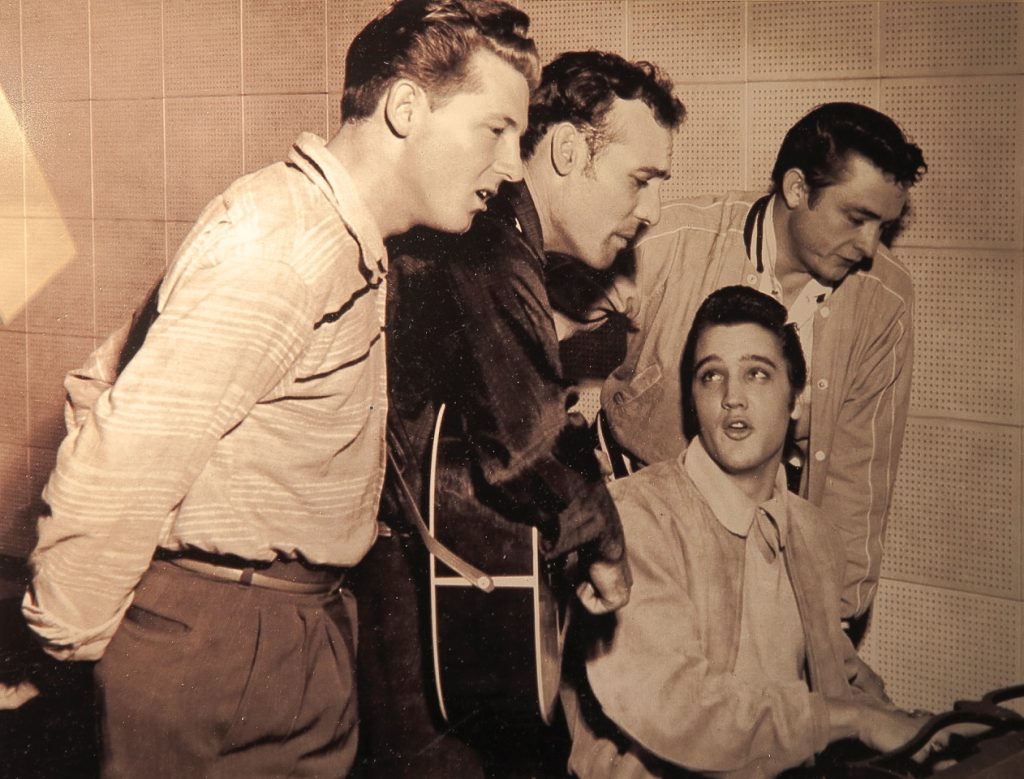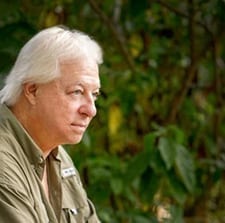The Million Dollar Quartet
April 18, 2024By Tom Poland
I go back now, back to August 1, 2012. That’s the day the University of South Carolina Press published Save The Last Dance For Me. Strange circumstances united me with the Society of Stranders, those dedicated shaggers. Together, we wrote the history of the shag. For me it meant an education and a discovery.
I began the work. In researching the blues and music in general I stumbled across a photograph of four musicians that haunted me. I intended to get it but never did. It wasn’t the Beatles. It was a quartet that preceded them—Jerry Lee Lewis, Carl Perkins, Elvis Presley, and Johnny Cash. George Pierce took it on December 4, 1956. Something about that Sun Studios photo haunts me still.

Jerry Lee Lewis, Carl Perkins, Elvis Presley, and Johnny Cash – Photo by George Pierce
My niece, Benton Cunningham, heard me talking about that photo. She gave it to me for Christmas. Some title it “Legends,” others “The Million-Dollar Quartet.” When I look at Pierce’s photo and I do so often, memories rise like ascending notes in some sad ballad. There they are, three unknowns on the brink of stardom and all the good and bad things it brings. And Elvis. Yes, Elvis who already had a taste of stardom.
An impromptu jam session took place and Pierce and his camera were there. His photo is subject to interpretation. Elvis sits at the piano, a puzzled Jerry Lee Lewis looks on, and a calm, sleepy-eyed Carl Perkins holds his guitar. Dreamy-eyed Elvis, seeking approval it seems, looks up at Perkins. Johnny Cash looks down at the keyboard. Make of it what you will.
That session has been described as “a convergence of genius, of talent at the time of unimaginable potential.” It was unplanned. Perkins was there for a recording session. Cash had stopped by to get an advance for Christmas shopping. Lewis was there as a studio musician for Perkins’s session. Elvis, a star on the RCA label, dropped in to visit with Sam Phillips.
The four men each had a Southern Christian heritage. They sang gospel songs … “Just A Little Talk With Jesus,” “Jesus Walked That Lonesome Valley,” “I Will Not be Moved,” and “On The Jericho Road.”
Lewis of Louisiana went on to be rock ‘n’ roll’s first wild man. His nickname? “Killer.” Perhaps you remember “Great Balls of Fire” and “Whole Lotta Shakin’ Goin’ On.” Erratic behavior, alcohol and drugs, tax debts, wild escapades, and six marriages made for a rocky road for Lewis.
Perkins of Tennessee went on to be a rockabilly star. The Beatles covered his songs “Honey Don’t” and “Everybody’s Trying To Be My Baby.” “Blue Suede Shoes” was a huge hit, but bad breaks and personal problems plagued Perkins. In his biography, Perkins, a quiet, self-effacing man, said, “I felt out of place when ‘Blue Suede Shoes’ was number one. I stood on the Steel Pier in 1956 in Atlantic City and the Goodyear blimp flew over with my name in big lights. And I stood there and shook and actually cried. That should have been something that would elevate a guy to say, ‘Well, I’ve made it.’ But it put fear in me.”
Perkins was prophetic. Be careful what you want; you just may get it. We know how things went for Elvis, and the Man in Black from Arkansas had his demons too. Drugs and alcohol amounted to a ring of fire.
In writing the shag history I reflected on something that’s quite obvious: most young people think their era is everything. Well, it isn’t. I had the same problem. You probably did too. Never forget, those you worship put their pants on one leg at a time too. Sooner or later trouble comes calling. I can’t name one song of Taylor Swift’s. I’m a tad proud of that. It proves I overcame Beatlemania, but if I were Swift, I’d study the bios of recording stars. Behind the stage demons gather. And wait. And wait for a chance to pounce.
Georgia native Tom Poland writes a weekly column about the South, its people, traditions, lifestyle, and culture and speaks frequently to groups in the South. Governor Henry McMaster conferred the Order of the Palmetto upon Tom, South Carolina’s highest civilian honor, stating, “His work is exceptional to the state.” Poland’s work appears in books, magazines, journals, and newspapers throughout the South.
Visit Tom’s website at www.tompoland.net
Email him at [email protected]






















